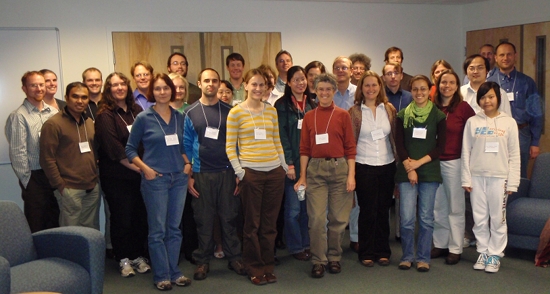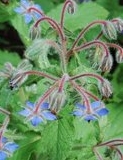| Description | Participants | Agenda | Summary | Products |
|---|
NIMBioS Investigative Workshop
New Soil Black Box Math Strategies

Topic: New Strategies for the Black Box: Identifying mathematical tools for elucidating plant-soil interactions
Meeting dates: October 15 - 17, 2009
Organizers:
Alison E. Bennett
(The James Hutton Institute, Invergowrie, Dundee, Scotland UK; formerly a postdoctoral fellow at the
Dept. of Entomology, Univ. of Wisconsin);
James Umbanhowar (Dept. of Biology, Univ. of North Carolina)
Objectives. Soil-plant interactions structure life as we know it. Research has demonstrated that individual plant communities, species and even individual genotypes can cultivate distinct soil communities of decomposers, mutualists, and pathogens. Various components of the plant-soil interaction have been explored, but few of these explorations have been integrated across ecological scales or included more than one component of the soil community. Similarly, individual theoretical approaches have focused on select groups (e.g. mutualists, decomposers, and pathogens) while excluding many soil organisms (e.g. soil fauna). In addition, theoretical approaches have rarely examined these groups at the same organizational scale, making it difficult to develop a comprehensive picture of plant-soil interactions. By extending our models to explore all levels of organization, we can take steps to building a comprehensive picture of plant-soil interactions that can then inform basic science as well as applied science, including restoration, conservation, and global change. During the Investigative Workshop, participants had the opportunity to identify theoretical frameworks for expanding our knowledge and driving the future of plant-soil interactions.
Evaluation report (PDF)
 Summary Report.
During the workshop, 32 participants collaborated to extend old and to build new models to explore all levels of organization in plant-soil interactions. Participants developed models exploring a wide variety of organisms (e.g., mutualists and decomposers) and abiotic factors (e.g., soil structure) and utilizing mathematical and computational tools. Participants focused on modeling specific questions as well as developing an overall understanding of current and future models and theory in soil-plant interactions. Five sub-groups formed to tackle specific questions, and each plans to produce at least one publication containing a mathematical model that addresses that issue. In addition, as a whole, the group developed a chart showing previous theoretical and mathematical explorations of soil-plant interactions, and this information will be published in a paper authored by the workshop participants. Several groups plan to meet again at NIMBioS to finalize their models, and two groups are preparing Working Group applications to further explore the evolution of soil pathogens and game theory within mutualisms.
Summary Report.
During the workshop, 32 participants collaborated to extend old and to build new models to explore all levels of organization in plant-soil interactions. Participants developed models exploring a wide variety of organisms (e.g., mutualists and decomposers) and abiotic factors (e.g., soil structure) and utilizing mathematical and computational tools. Participants focused on modeling specific questions as well as developing an overall understanding of current and future models and theory in soil-plant interactions. Five sub-groups formed to tackle specific questions, and each plans to produce at least one publication containing a mathematical model that addresses that issue. In addition, as a whole, the group developed a chart showing previous theoretical and mathematical explorations of soil-plant interactions, and this information will be published in a paper authored by the workshop participants. Several groups plan to meet again at NIMBioS to finalize their models, and two groups are preparing Working Group applications to further explore the evolution of soil pathogens and game theory within mutualisms.
Products
Publications
Abbott KC, Karst J, Biederman LA, Borrett SR, Hastings A, Walsh V, Bever JD. 2015. Spatial heterogeneity in soil microbes alters outcomes of plant competition. PLoS One, 10(5): e0125788. [Online]
Bennett AE et al. 2019. Beyond the black box: promoting mathematical collaborations for elucidating interactions in soil ecology. Ecosphere 10:7:e02799 [Online]
Hrynkiv V, Koshkin S. 2014. Invasion waves in the presence of a mutualist. Mathematical Methods in the Applied Sciences, 37(15): 2185–2197. [Online]
NIMBioS Investigative Workshops focus on broad topics or a set of related topics, summarizing/synthesizing the state of the art and identifying future directions. Workshops have up to 35 participants. Organizers and key invited researchers make up half the participants; the remaining participants are filled through open application from the scientific community. Open applicants selected to attend are notified by NIMBioS within two weeks of the application deadline. Investigative Workshops have the potential for leading to one or more future Working Groups. Individuals with a strong interest in the topic, including post-docs and graduate students, are encouraged to apply. If needed, NIMBioS can provide support (travel, meals, lodging) for Workshop attendees, whether from a non-profit or for-profit organization.
A goal of NIMBioS is to enhance the cadre of researchers capable of interdisciplinary efforts across mathematics and biology. As part of this goal, NIMBioS is committed to promoting diversity in all its activities. Diversity is considered in all its aspects, social and scientific, including gender, ethnicity, scientific field, career stage, geography and type of home institution. Questions regarding diversity issues should be directed to diversity@nimbios.org. You can read more about our Diversity Plan on our NIMBioS Policies web page. The NIMBioS building is fully handicapped accessible.
NIMBioS
1122 Volunteer Blvd., Suite 106
University of Tennessee
Knoxville,
TN 37996-3410
PH: (865) 974-9334
FAX: (865) 974-9461
Contact NIMBioS


